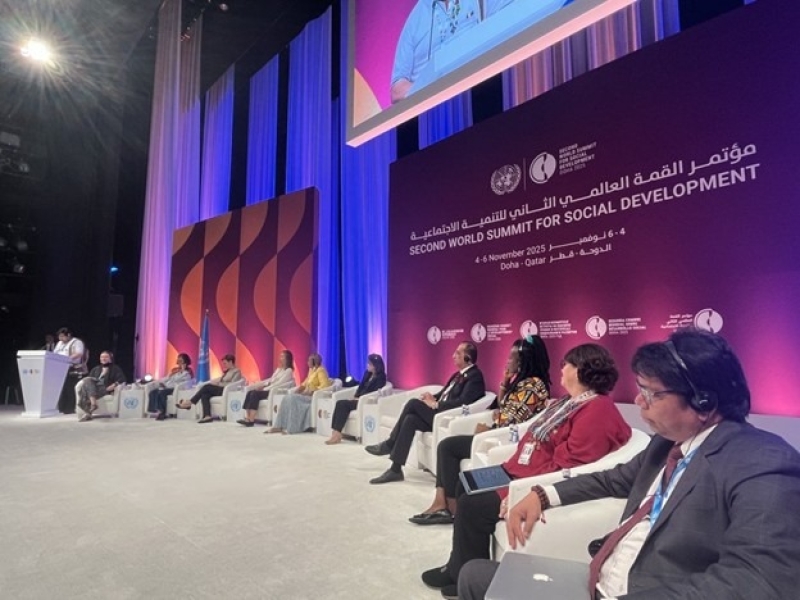- 80pc tube wells in Chhatak run dry; water crisis acute |
- Advance Eid train ticket sale begins |
- Dhaka’s air quality world’s worst Tuesday with an AQI of 240 |
- Heads of Sonali Bank, IDRA, and SBC resign citing personal reasons |
World Social Summit in Doha Calls for Action, Not Words

Session of the Second World Summit for Social Development in Doha
Qatar hosted the Second World Summit for Social Development from 4–6 November. According to the United Nations, more than 40 Heads of State and Government, 230 ministers and senior officials, and nearly 14,000 participants attended the event.
Beyond plenaries and roundtables, over 250 “solution sessions” identified practical ways to advance universal rights to food, housing, decent work, social protection, education, health, care systems, and other public services, as well as to uphold international labour standards and combat poverty and inequality.
In these challenging times for multilateralism, the summit achieved what many had doubted — a global agreement known as the Doha Political Declaration. UN Secretary-General António Guterres hailed the document as a “booster shot for development,” urging leaders to deliver a “people’s plan” that tackles inequality, creates decent work, and rebuilds social trust.
The summit inevitably drew comparisons with the landmark 1995 World Social Summit in Copenhagen, which gathered 117 Heads of State and Government. Thirty years later, the Doha Declaration is largely a recommitment to earlier promises. Though significantly improved during negotiations, the text has been described by some participants as lacking inspiration.
The sharp drop in top-level attendance — from 117 to just over 40 leaders — was widely noted in the corridors of the Doha Convention Center. The limited participation, especially from high-income countries, raised questions about shared responsibility for the Doha consensus and the global Sustainable Development Goals (SDGs).
Even so, many veteran observers urged pragmatism. Both the Copenhagen Declaration and the Doha outcome are viewed as workable frameworks to advance social justice. While not ideal, the Doha agreement addresses key global challenges and represents a rare moment of consensus at a time of weakened multilateral cooperation.
Juan Somavía, former UN Under-Secretary-General and a key architect of the 1995 summit, welcomed the Doha Declaration as a “meaningful foundation” to move the agenda forward. Roberto Bissio, coordinator of Social Watch and a leading participant in Copenhagen, said: “Let’s revive hope in these turbulent times. Now in Doha, our governments are renewing their pledges of three decades ago and adding new commitments to reduce inequalities, promote care, and ensure universal social protection, which is a human right.”
However, both Somavía and Bissio — along with numerous UN and civil society leaders — stressed the gap between commitments and delivery. “People expect results, not rhetoric,” UN Deputy Secretary-General Amina Mohammed said at the closing session. “The outcomes of this Summit provide a strong foundation. What matters most now is implementation.”
The true test, participants noted, lies in whether governments translate the Doha Declaration into tangible action — through budgets, laws, and programmes that reach people. Magdalena Sepúlveda, Director of UNRISD, called for bold political will: “What we need now is for states to implement the Doha Declaration swiftly and with bold measures.”
Yet the global trend is moving in the opposite direction, as many governments impose austerity measures and cut funding for social development. More than 6.7 billion people — or 85% of the world’s population — live under austerity conditions, and 84% of countries have reduced investment in education, health, and social protection, fuelling protests and social unrest.
“The concept of the welfare state is being eroded before our eyes by an ideological commitment to austerity and a shrinking state,” said Amitabh Behar, Executive Director of Oxfam International. “A wave of youth-led Gen Z protests is sweeping the world. A recurring slogan during recent protests in Morocco was, ‘We want hospitals, not stadiums.’ Public services are being dismantled while wealth is hoarded at the top. The social contract will not survive this neglect.”
Still, experts emphasized that governments have viable options to finance the Doha commitments. Austerity, they argued, is a choice — not an inevitability.
At least nine financing alternatives exist: raising progressive taxes on corporations, finance, wealth, property, and digital services; curbing illicit financial flows; restructuring debt; increasing employers’ social security contributions; formalizing employment; reallocating spending away from defence; using fiscal and foreign-exchange reserves; increasing aid and transfers; adopting more flexible macroeconomic policies; and issuing new Special Drawing Rights.
In a world awash with money but marked by deep inequality, finding the funds is ultimately a question of political will.
History will not judge Doha by its declarations, but by whether its promises — on rights, jobs, and equity — translate into reality. Implementation is possible, even in the poorest countries. If leaders follow through, Doha may be remembered not as an echo of 1995, but as the moment when words finally gave way to action.
— Isabel Ortiz, Director of Global Social Justice, formerly served as Director at the International Labour Organization (ILO) and UNICEF, and as a senior official at the UN and the Asian Development Bank.

